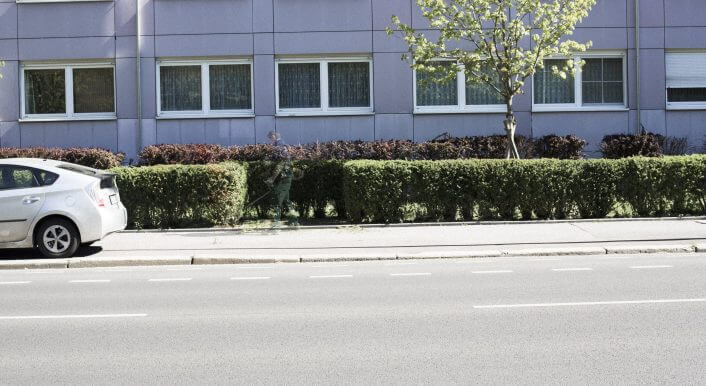Hundreds of Thousands are Invisible
Nobody knows how many undocumented people live in Germany and Europe. For that reason our investigation is called “The Invisibles”. Dita Vogel, an academic at the University of Bremen, conducted a study several years ago that sought to determine the number of Invisibles. Her conclusion: hundreds of thousands of people are not allowed to be in Germany – and millions in Europe.

The result is only a rough estimate. Florian Bickmeyer spoke with Vogel about how she calculated the number, about scary numbers and about her current investigation: about children in illegality.
Ms. Vogel, it is due to the very nature of the issue that we do not know how many undocumented people live in Germany and in Europe. But you have come up with numbers. Tell us, how many people are there who live without documents and in illegality?
Dita Vogel: That is very difficult to estimate. Since the Clandestino study there have been no other investigations that looked at the individual member states with their widely varying conditions. At the time, we estimated the following: between 1.9 and 3.8 million people lived in the EU without residency papers in the year 2008. That was 0.4 to 0.8 percent of the total population and 7 to 13 percent of foreigners. For Germany we assumed there were between 200,000 and 460,000 people. After that the data initially shows a decline before increasing again since 2010, so that the updated estimate for 2013 was of similar dimensions: I later updated the number: for 2013 I estimate that there were 150,000 to 450,000 people.

Dita Vogel
Those are large ranges of numbers. How did you estimate them?
We looked at the police crime statistics. The most important thing is to bear in mind that the statistics are distorted – and to try to use this distortion to estimate an upper and a lower limit. The idea is that undocumented people show up in the crime statistics more frequently in relation to the German population and less frequently in relation to the foreign population.
Why would that be the case?
People who live without documents are very careful. They try to stay away from the police and from crime. But at the same time they have characteristics that make it more likely for them to receive attention from the police. It is less likely that a white 70 year old woman who lives in a retirement home will be asked by the police for her ID than a black 20 year old man. That means this method always has a significant degree of fuzziness which we have to live with in the statistics. But I think there are good arguments that the correct number lies within the mentioned range – somewhere.
Sometimes there is talk about more than a million undocumented people who live in Germany. That would be more than two times as many.
Such large numbers are not helpful in the discussion. Those who want to put something on the agenda look for a number that’s as large as possible. But that backfires, then the decision-makers are incredibly scared, it rather leads to political standstill. If one wants to achieve something for the people, one should be careful with the large numbers I think. A half a million people are already very many.
Then let us stay with your numbers: between 150,000 and up to half a million. What do you know about these people?
We can generally assume that the numbers are slightly rising at the moment. Then the number is young men who enter the country illegally is often overestimated. While the number of older women is underestimated. Since Clandestino, we assume that men only have a slight prevalence within the group. That is also because people can only survive for a longer time in illegality if they find work. One possibility of employment in is private households – and that is a predominantly female sector. Many come from the EU’s neighbor states, from Albania, the Ukraine, Turkey or Morocco. What we noticed: people from the large, most populous countries in the word are also represented here to a relatively large extent in illegality – from Asia Chinese or Indians, from Africa Nigerians, from South America Brazilians. Finally there is also a larger group of people from countries marked by war or crisis but who still do not generally receive asylum in Germany. People who come from Syria right now can be almost sure to receive some sort of humanitarian status – that is not necessarily the case for Afghanistan, Pakistan or many African countries.
How did people react to your numbers? Up to half a million people living without documents. One could say: that is a great number; that is important for our country. One could also say: that is hardly half a percent of Germans; that is not so important.
I think that since these numbers have been around it has become more difficult to cry out for more controls because of an uncontrollable number of people who count as illegal. Of course that is still done anyway – because the will to control migration is primarily motivated by the number of people who are still outside the country, who could still be coming. The people who are already inside are important for other questions. For example: can we regularize individual groups? Will our school system by bursting at the seams if children without a residency status are also allowed to go to school? Will our health system fall apart if these people all have a right to medical care? The estimate was primarily important for the humanitarian questions. The number has contributed to implementing sensible regulations in German politics. Such as that the health and school authorities’ obligation to report was changed. For example, people who work at schools here no longer have to report to the authorities when they find out about undocumented people. And they also have no right to do it anymore because the data is protected – but it is another question whether every person working there really knows that.
Let us talk about undocumented children. How do children fare in illegality?
Their number is presumably rather small. But for every single child the situation can have dramatic consequences for the rest of their life. For example if a child can’t go to school – because there are institutional regulations that prevent it; or if the schools have not been adequately informed that they also have to accept this child; or if the parents’ fear stands in the way. The children are not the ones who make a decision about migration and illegality. The decision is made for them. And the parents of often afraid of being caught.
At the Annual Meeting on Illegality you introduced a study on this issue that you are starting at the moment: undocumented children and their possibilities for going to school. Have you already gathered an impression about how these possibilities stand?
The schools have no routines for dealing with such children. An inquiry about whether a child can go to a certain school might already fail with the school secretary who says over the telephone: „No, that won’t work. You can’t register your child here without proof of legal residence.“ We should be establishing the following principle: „No child should get lost, every child has a right to go to school“ – even if there is no proof of legal residence. The ministers of education are convinced that this is the case everywhere in their states. I also think the principle is taken seriously. In every state, letters were written to the schools that legal proof of residence is not necessary. But I’m not sure if that is enough. My impression is that this principle has not been picked up yet by all school administrations and secretariats. The affected parents also often don’t believe that it’s possible to register their child at a school.
Finally: what would you ask of the politicians?
I would wish that hardship cases be construed more broadly, that there be more possibilities for people who have lived in illegality for many years to still find a way out. I see the abolishment of the obligation to report undocumented people as a step forward and wish that it be implemented across all areas in a way that works – access to legal employment protection, to school, to medical care. My last wish concerns legal employment protection, the ability to claim wages from abroad: there is an EU directing according to which everyone has the right to receive a wage for work they have performed, even if they lived and worked here illegally. But it is very, very difficult to make such a claim from abroad. There should be more ways to help people claim their wages in the country or after returning abroad. I don’t believe that everyone who is here illegally once will stay here. And I don’t think we should make it easy to cheat and exploit these people. The people working regularly in Germany should also have an interest in preventing employers from getting away with cheating people without the right of residence of their promised wages.
Translation: Noah Walker-Crawford
Editor: Florian Bickmeyer
Design: Thorsten Franke, Simon Jockers, Ivo Mayr



